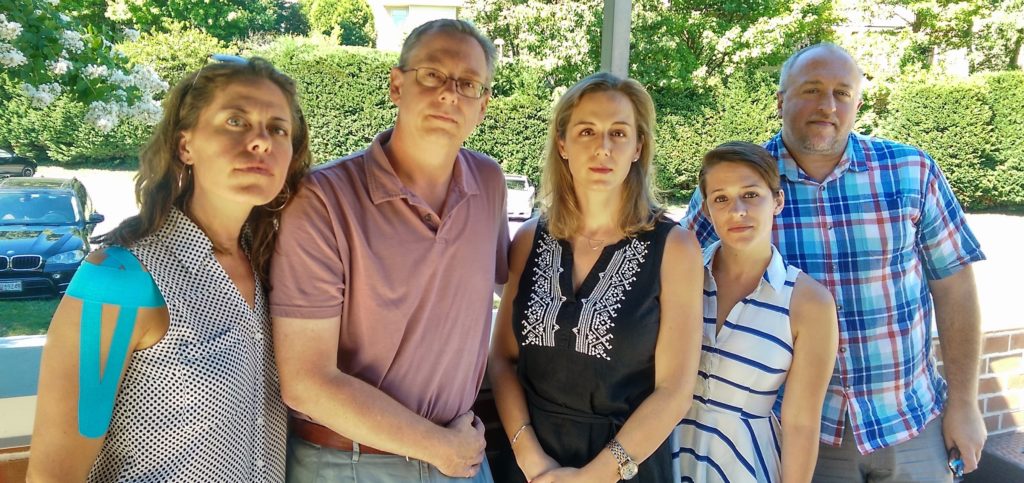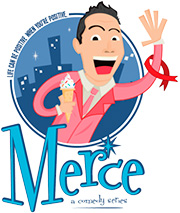[fusion_builder_container hundred_percent=”yes” overflow=”visible”][fusion_builder_row][fusion_builder_column type=”1_1″ background_position=”left top” background_color=”” border_size=”” border_color=”” border_style=”solid” spacing=”yes” background_image=”” background_repeat=”no-repeat” padding=”” margin_top=”0px” margin_bottom=”0px” class=”” id=”” animation_type=”” animation_speed=”0.3″ animation_direction=”left” hide_on_mobile=”no” center_content=”no” min_height=”none”]

The Chase Brexton “Fired Five” include (l-r) Jill Crank, Warren Conner, Catherine Fowler, Bethany Henderson, and Ken Ruby.
The five managers who were abruptly fired last month without notice by Chase Brexton, Baltimore’s largest healthcare provider to the city’s most vulnerable populations, met for lunch earlier this week. It was the first in-person meeting of the group since their dismissal in early August.
They traded job search updates and mutual empathy. A couple of them had tentative leads, but finding positions with an HIV or LGBT component, areas in which they are all uniquely qualified, has been a challenge.
They were hopeful during their lunch, sharing laughs and maybe a little gossip about their former employer, but the shock of the last month still registered on their faces. They all know they may never have the opportunity to serve the kind of clients they adored during their tenure at Chase Brexton.
During an internal battle this summer over an effort by their healthcare practitioners to unionize, Chase Brexton leadership did something unthinkable for an agency founded as a community clinic for gay men. They fired the five management-level employees, two of whom had worked for the agency for more than twenty years, in a transparent attempt to intimidate employees into rebuking the union. The cynical move backfired miserably when, a few weeks later, healthcare practitioners voted 87-9 in favor of joining the union.
The fired managers were Jill Crank, Catherine Fowler, Warren Conner, Bethany Henderson, and Ken Ruby. They received no severance pay beyond vacation days owed them. Their crucial expertise included serving LGBT people facing addiction, HIV, and medical issues surrounding gender transition. They all claim without hesitation that nothing in their personal records warranted their dismissal. None of their positions have been replaced.
During their lunch together, amidst moments of good humor, feelings of confusion and abandonment ran high. “I feel as if I have suffered a major loss in my life,” said Catherine Fowler. “In one moment my job, my team, my co-workers, my work with patients, was all taken away from me. It was a shocking, devastating event.”
“My initial reaction was to run away from Baltimore because I felt like I was being kicked out of my own LGBTQ community,” said Bethany Henderson. It has only been the support of her former staff, friends, and the community that has kept her spirits lifted.
Without exception, the former managers support the vote to unionize. But they know that these developments have lulled the community into a sense that leadership problems at Chase Brexton have been resolved – or that their personal struggles since being caught in the crossfire of the conflict will be forgotten.
“The biggest impact has been emotional, to be honest,” said Warren Conner, who met his husband at Chase Brexton during his twenty-year tenure there. The couple recently bought a new home, intensifying the urgency for Warren to find work. All of their life plans have been put on hold. “I’ve had a job since I was 14 years old. I have never not worked and being unemployed really plays with my self-confidence.” At lunch, Warren’s salad sat in front of him, untouched. “My anxiety has flared up quite a bit,” he explained.
Even with their personal trials, the impact on their former patients weighs heavily on the fired managers. “We cannot forget that the people who will suffer the most in the end are not those of us who were fired,” said Jill Crank. “It’s the patients who lost their most precious health care advocates.”
Since mounting a large protest in front of Chase Brexton’s Mt Vernon location after the firings, local activists, including many associated with a dozen LGBT agencies that signed an open letter critical of Chase Brexton leadership, have continued to discuss further activism. Their demands include the reinstatement of the managers and the removal of Richard Larison, the mercurial CEO largely viewed as the architect of the anti-union efforts. His four-year tenure, according to staff reports, has been littered with vindictive firings and a high level of distrust.
Whatever the outcome of ongoing community pressure for change at Chase Brexton, it may have little impact on five lives that are forever changed — and on those they served with heart and dedication.
“I am trying to see the positives in this experience,” said Catherine Fowler, “but at the end of the day it was a life-changing event that has been tremendously difficult.”
Posing for a photo together following lunch, the five former managers initially seemed unsure of the emotion they wanted to project. One or two smiled at first, and then thought better of it. A moment later, independent of one another, they all settled into strikingly similar expressions.
Their faces were unified in defiance and pride. Only their eyes, caught in the worry of an uncertain future, betrayed them.
Mark[/fusion_builder_column][/fusion_builder_row][/fusion_builder_container]







